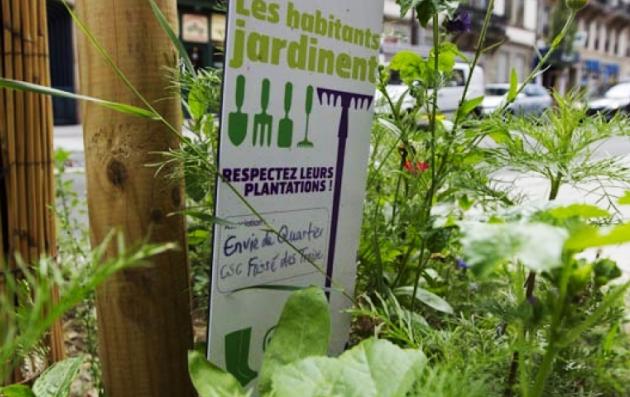Date of label : 02/06/2017
-
Eurometropolis Strasbourg , France
-
Size of city : 484.157 inhabitants

Summary
Strasbourg (FR) is steadily working on improving its environmental impact, and on promoting biodiversity. In 2008, it stopped using pesticides and integrated plants into the urban landscape. The charter “All united for more biodiversity”, launched in 2012, constituted another step in this direction: it gathers 75 signatories which are both professional and non-professional organisations. They commit to biodiversity by taking actions such as reducing light pollution or setting up green walls. Through the charter, all stakeholders are given the opportunity to work together, thus strengthening an eco-friendly network and multiplying its impact on the territory.
The solutions offered by the good practice
Supporting nature and biodiversity is an absolute necessity. The charter “All united for biodiversity” can help answer some issues faced by cities nowadays. By engaging all willing stakeholders in the territory, the charter is strengthening the existing ecological network. This is a significant improvement: the actions of the Eurometropolis of Strasbourg are limited to some areas, but with the help and good will of many stakeholders, the impact can be multiplied. Moreover, the stakeholders are accompanied when they sign the charter. They have to choose between six actions of various types that are listed by categories. For example, “Preserving the environment” equals abandoning the use of pesticides, “Save energy and resources” means reducing watering or light pollution, “Planting for biodiversity” is implementing local species and meadows for bees, and “Protect and develop the ecosystem” includes installation of biodiversity shelters and green walls and/or roofs. All of these actions can truly improve biodiversity around the firm that chooses to sign, and thus improve the possibility of a strong ecological network.
Building on the sustainable and integrated approach
The project “All united for more biodiversity” is based on sustainable development and participatory approach. The commitment of a wide panel of stakeholders all along the territory is making the city greener and more ecological. By reconnecting the spaces of nature, this ecological network will be useful to make the city more resilient and better integrated into its environment. By sharing nature-friendly managements, it is also improving the global natural health of the territory. Another important asset of this project is the commitment of all: businesses, organisations, sponsors, social housing, administrators and developers, as well as the communes within the Eurometropolis of Strasbourg can be involved and act for more biodiversity.
Based on a participatory approach
The charter “All united for more biodiversity” is a participatory approach. Firstly, all stakeholders on the territory were given the chance to work together for the first time, thus developing a global and coherent approach and connecting ecological spaces responding to each other. This process has a real strength, as it shares experiences. The stakeholders can exchange their successes and problems, therefore creating another type of network. Moreover, the Eurometropolis is supporting the change of management in a real cooperation between the local administration and private or public bodies. Secondly, the actions proposed in the charter often create a new dynamic. Employees of the signatory structure might be invited to participate, and many examples show that they are genuinely interested in the procedure. 88% of the concerned structures decided to involve their staff. Managing green spaces in a sustainable way is not only an environmental matter, it also creates new opportunities to develop social links inside the firm.
What difference has it made?
Upon its creation in 2012, the Charter was signed by 23 stakeholders, which is already something. Today, five years later, we have the pleasure to count 75 signatories, a real community reunited for biodiversity, and for all of them, the signature had positive consequences. One of the main measures has been the abandonment of pesticides in the management of green spaces. While 89% used them when signing, this commitment truly made a difference. 84% of the signatories have pledged to plant local species, whether meadows, natural hedges or fruit trees. Many detailed examples can be found in the guide printed recently, but here is an example: Mondelez International (Suchard factory) signed the charter in 2012. Its first decision was to involve the staff: the choice of the first six actions was made in cooperation with a group of motivated employees. Among the first decisions were the ban of pesticides, a fauna/flora diagnosis, and the implementation of 19 beehives. Many other projects followed: a shared garden, the installation of 16 nest boxes (both specialised and unspecialised), etc. There are more future projects: shared composting, the implementation of a school orchard and fruit trees, the creation of a pond...
Why should other European cities use it?
This project is unique because it not only involves the citizens and the public stakeholder, but also the professional area. They have a real allowance on the territory, but paradoxically, they are less often involved in biodiversity projects. This good practice can be very interesting for other European cities because the loss of biodiversity and the sustainable city is not an issue faced only by France, but by all other big cities in the world. An ecological network at a different scale could also be imagined: European cities working together to improve the place of biodiversity. Since the Paris COP 21 climate change conference held in December 2015, 175 countries committed to reduce climate change: no doubt, increasing biodiversity and ecological management is part of the process.
-
455_Strasbourg_Gpsummary.pdf(PDF, 322Ko)
